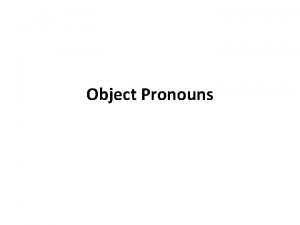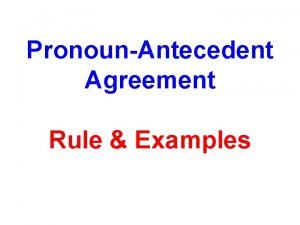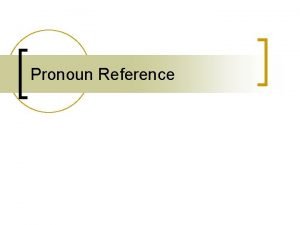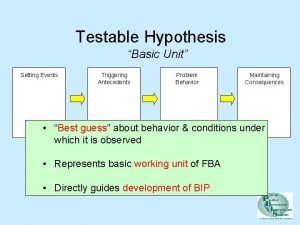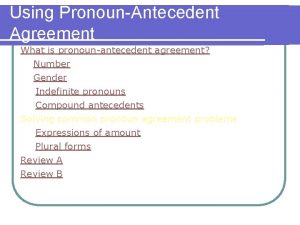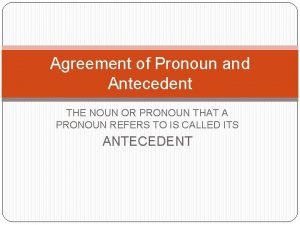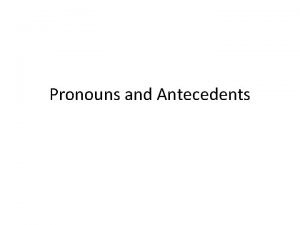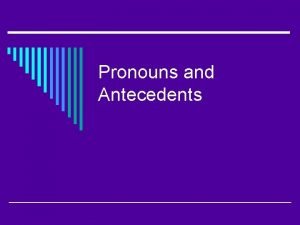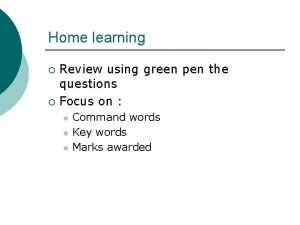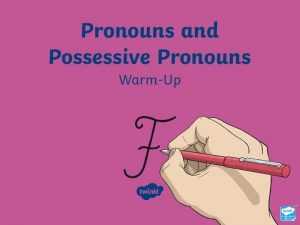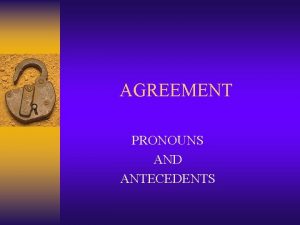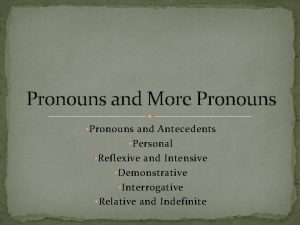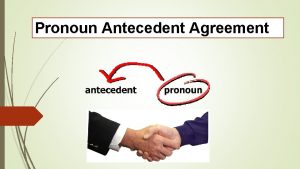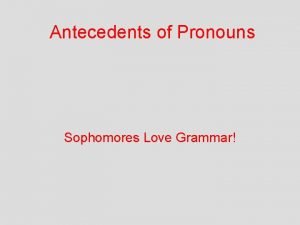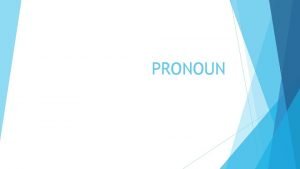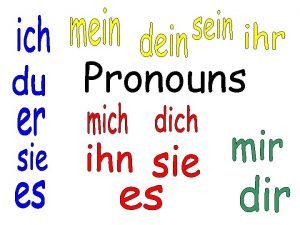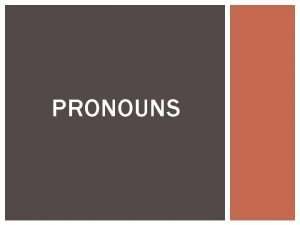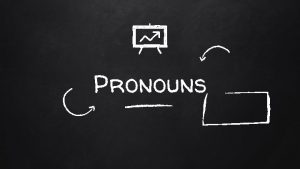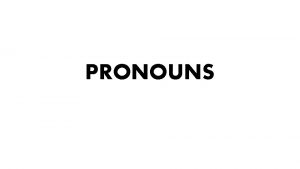Pronoun Notes Pronouns and Antecedents A pronoun is















- Slides: 15

Pronoun Notes

Pronouns and Antecedents • A pronoun is a word used in place of a noun or more than one noun. • Examples: After Lois borrowed the book, Lois lost the book. After Lois borrowed the book, she lost it. • The pronoun she replaces the name Lois in the second sentence, and the pronoun it replaces the word book.

• The antecedent is the word that a pronoun stands for or refers to. • Example: Frederick, have you turned in your report? Frederick is the antecedent of the pronouns you and your. • Sometimes the antecedent is not stated. • Example: It was hot outside today. • It is the pronoun, but the sentence has no antecedent.

Personal Pronouns • A personal pronoun refers to the one speaking (first person), the one spoken to (second person), or the one spoken about (third person). • Personal Pronouns: First Person Singular First Person Plural I, me, my, mine we, us, ours Second Person Singular Second Person Plural you, your, yours Third Person Singular he, him, his, she, hers, its Third Person Plural they, them, theirs

• Personal Pronoun Examples: – I am the best player on the team. – Give that book to her. – You are my best friend. – Did you see them last night? – We are taking notes every day this week!

Possessive Pronouns • A possessive pronoun is a pronoun that shows ownership or relationship. • Possessive Pronouns: First Person Singular First Person Plural my, mine our, ours Second Person Singular your, yours Second Person Plural your, yours Third Person Singular his, hers, its Third Person Plural their, theirs

• • • Possessive Examples: The truck is mine. The car belongs to her. His shirt is brown. Their favorite movie is Shrek.

Reflexive Pronouns • A reflexive pronoun refers to the subject and directs the action of the verb back to the subject. • A reflexive pronoun is essential to the meaning of the sentence. If you remove the pronoun, the sentence will not make sense. • Example: Tara enjoyed herself at the party.

Intensive Pronouns • An intensive pronoun emphasizes a noun or another pronoun. • Intensive pronouns are not essential to the meaning of the sentence. If they are taken out, the sentence will still make sense. • Example: I myself cooked that delicious dinner.

List of Reflexive and Intensive Pronouns First Person myself, ourselves Second Person yourself, yourselves Third Person himself, herself, itself, themselves

Demonstrative Pronouns • A demonstrative pronoun points out a person, a place, a thing, or an idea. • Demonstrative Pronouns: this, that, these, those • Examples: This is the book I told you about. Are these the kinds of plants that bloom at night?

Interrogative Pronouns • An interrogative pronoun introduces a question. • Interrogative Pronouns: what, which, whom, whose Examples: What is the best brand of frozen yogurt? Who wrote Harry Potter?

Indefinite Pronouns • An indefinite pronoun does not refer to a definite person, place, thing, or idea. • Common Indefinite Pronouns: all, anyone, both, either, everything few, more, much, nobody, none, no one, other, several, some • Example: Both of the girls forgot their lines.

• Some indefinite pronouns are always singular. • Examples: any, anyone, everything, nobody, no one, either • Some indefinite pronouns are always plural. • Examples: all, both, few, more, much, other, several, some

Relative Pronouns • A relative pronoun introduces a subordinate clause. (We will learn what a subordinate clause is later. ) • Relative Pronouns: that, which, whom, whose • Example: Thomas Jefferson, who wrote the Declaration of Independence, was our country’s third president.
 Italicized pronoun examples
Italicized pronoun examples Plural object
Plural object Plural antecedent
Plural antecedent Subject pronoun and object pronoun
Subject pronoun and object pronoun Setting events and antecedents
Setting events and antecedents Plural antecedent
Plural antecedent Compound antecedent
Compound antecedent Compound antecedent example
Compound antecedent example Carrons antecedents
Carrons antecedents Introduction of total quality management
Introduction of total quality management Whats a vague pronoun
Whats a vague pronoun Whats antecedents
Whats antecedents Green pen feedback
Green pen feedback Antecedents of functionalism
Antecedents of functionalism Personal pronouns and possessive pronouns
Personal pronouns and possessive pronouns Possessive
Possessive

